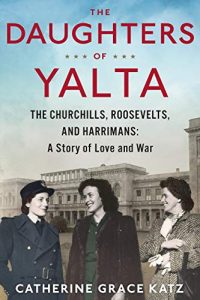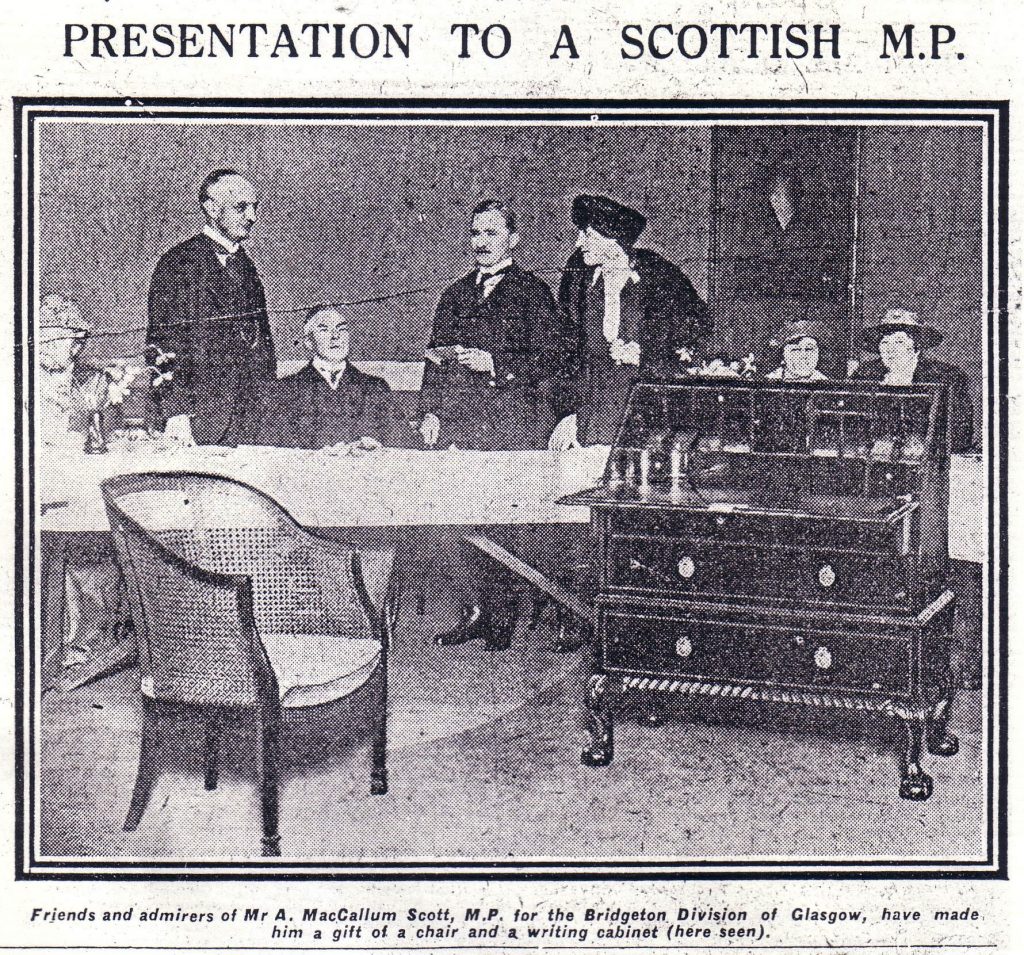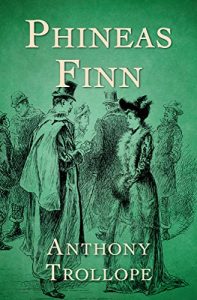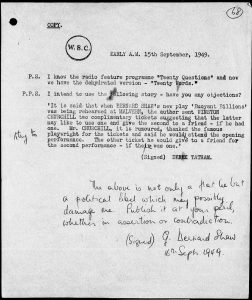
Finest Hour 190
“What a Tale It Is!”

MacCallum Scott (standing left)
February 12, 2021
Finest Hour 190, Fourth Quarter 2020
Page 23
By David Stafford
David Stafford is author of Oblivion or Glory: Churchill 1921 (2019). His previous books include Churchill and Secret Service (1997) and Roosevelt and Churchill: Men of Secrets (2000).
On the morning of Saturday, 25 August 1928, a passenger plane took off from Victoria, British Columbia’s capital city on Vancouver Island, bound for Seattle some eighty miles to the south across the Strait of Juan de Fuca. The international service had been inaugurated just two weeks before, and the Ford Tri-Motor monoplane—otherwise known as “The Tin Goose”—was the largest and most modern commercial aircraft in the world. But it never arrived at its destination. Twenty minutes into its flight, it ran into thick fog and crashed into the sea near Port Townsend in the state of Washington. None of those on board, two crew and five passengers, survived. It was the worst tragedy so far in North American commercial aviation and for this reason alone made international headlines. But the tragedy involved something more. Amongst the bodies that washed ashore in the days that immediately followed were those of Churchill’s first biographer, Alexander MacCallum Scott, and Scott’s wife. Scott’s place in the Churchill story has been badly overlooked.1
Scott was born the same year as Churchill, but in the more modest circumstances of an old ferryman’s cottage in Blantyre, Scotland. He was the son of a market gardener and Presbyterian church elder, who died when Alexander was fourteen. This left his mother Rebecca to bring up her children alone. Thanks to a bursary, Scott went to Glasgow University, where he was a contemporary of the novelist John Buchan, became president of the student union, and launched himself into Liberal politics. Like many ambitious Scots of that era, he moved to London, where he qualified as a barrister, was elected a borough councillor in Lewisham, and became a radical journalist and author. In 1910 he entered the House of Commons as the Liberal MP for Glasgow Bridgeton, a seat that he was to hold for the next dozen years.
MP Turned Biographer
Scott by his own measure was only a moderate success in politics, a fact that he attributed to his lack of personal wealth, powerful friends, and charisma. Instead, he was strongly drawn to the contemporary who clearly possessed all of these attributes: Winston Churchill, who had entered Parliament in 1900 as a Conservative. In May 1904 the elder son of Lord Randolph Churchill, who had electrified British politics a generation before with his meteoric rise and fall as Chancellor of the Exchequer, stunned the House of Commons by crossing the floor to join the Liberals over the issue of free trade. Scott was delighted that the Liberal cause now found a powerful and eloquent ally. As Churchill readied himself to stand as a candidate for Manchester North West in the next general election, Scott turned a series of press articles he had written into a brisk and well-illustrated biography entitled simply Winston Spencer Churchill. With furious cries of “turncoat,” “apostate,” and “opportunist,” being hurled at his subject by Conservatives, Scott launched a vigorous and lively defence by arguing that the change was merely that of party colour, not of principle.

2025 International Churchill Conference
Yet it was less Churchill’s stand on policy than his personality and future prospects that attracted Scott to his subject. Here, he enthused, was a “youth of thirty…confidently spoken of by his admirers as a future Prime Minister.” Scott’s own admiration of Churchill shone from every page. “He is of the race of giants,” Scott declared. “In the tempestuous gambols and soaring ambitions of his youth, we read the promises of a mighty manhood.” He also lauded Churchill’s power with the pen that “gave abundant evidence of mature thought, of penetrating criticism, and of profound political instinct,” not to mention his ability to describe scenes that “seem to lie like a picture on the page.” In his final chapter, entitled “A Future Leader,” Scott draws the portrait of a vivid personality who compels attention, excites curiosity, and is a born orator. “Churchill uses words with the practiced skill of an artist, not only to state facts,” Scott writes, “but to express fine and complex shades of meaning, to excite emotion, to arouse sympathy, to carry conviction.” This is as succinct and perceptive a summary of Churchill’s rhetorical gifts as any offered by most subsequent biographers. Churchill’s greatest gift, proffered Scott, was that of character, as revealed in the adventurous course of his life as army subaltern, war correspondent, and politician: one of “will, courage, originality, and magnetism.” Finally, Scott concluded, Churchill “plays for high stakes, but his nerve is steady and his eye is clear. He will at any rate make a fight for it, and the fight will be something to have lived for and to have seen.”2
Doubling Down
Ten years later came the disaster of the Dardanelles and Churchill’s humiliating fall from grace amidst a torrent of savage and accumulated criticism that poured from the mouths of political enemies, rivals, and even friends. By contrast, Scott once again championed his cause. He revised and extended his biography and in 1916 brought it out under a new title, Winston Churchill in Peace and War.3 It presented more than a cogent defence of Churchill’s actions at the Admiralty, robust though that was. It also prophesied that Churchill was far from finished and still had a shining future ahead of him. Indeed, argued Scott, he believed Churchill would emerge from the crisis as a better and stronger man. “If Churchill be the man of genius and of power which his past career would indicate,” Scott predicted, “he will come again, and he will be all the stronger and wiser for the bitter experience through which he has passed.”4 This was the message, too, of the book’s Foreword, written by the distinguished editor of The Observer newspaper, J. L. [“Jim”] Garvin. “A hard check in mid-career best shows of what stuff a statesman is made,” Garvin wrote. “If…Mr. Churchill is full, as I judge, of the right stuff of mind and fibre, his future will take care of itself.” Garvin was one of the rare Conservatives to find a single good word to say at this time about Churchill.
Soon afterwards Scott drew closer in practical ways to Churchill. In 1917 he joined him as his parliamentary private secretary at the Ministry of Munitions and the next year followed him to the War Office, where he stayed for several months before reluctantly resigning on the grounds that he could no longer afford the time it took. Later, at Churchill’s suggestion, he was appointed the Scottish Whip in Lloyd George’s coalition government, and he held the position until being swept away, as was Churchill himself, in the General Election of 1922. With the virtual disappearance of the Liberals as a radical political force in Britain, Scott joined the Labour Party and became friends with its leader, Ramsay MacDonald, who was to become Labour’s first Prime Minister in 1924. By the time he perished in the waters of Juan de Fuca Strait, Scott was the prospective Labour Party candidate for the Scottish constituency of East Aberdeenshire, a seat then held by another erstwhile follower of Churchill, the radical Tory MP, Robert Boothby.
People Power
There is no written record of Churchill’s reaction to the tragic death of his first biographer. But we must imagine that it could only have been generous. For Scott and Churchill were not just biographer and subject. They were active collaborators in defending and promoting his career.
Scott penned his first biography as a deliberate effort to promote Churchill’s campaign in North West Manchester. To ensure that his subject approved the contents, Scott sent Churchill the proofs in advance. Similarly, for the updated 1916 edition, the two men again marched in step. After his demotion and departure from Asquith’s government over the Dardanelles, Churchill threw his energies into constructing an extensive dossier of documents in defence of his actions. Learning of Scott’s decision to update his original biography, in the spring of 1916 Churchill lent the dossier to Scott as background material for the new book. Not surprisingly, Churchill was pleased with the result. “Pleasant reading,” he enthused to Clementine after finishing the section about the Dardanelles in the proofs that Scott sent to his advanced battalion headquarters at Laurence Farm near Ploegsteert in Belgium. “What a tale it is!”5
By way of return, Scott helped Churchill with some frank advice about the strategy he planned for his political comeback in the House of Commons, where by that summer he had become a vocal backbench critic of the Asquith government’s performance. In the first edition of the biography, Scott had identified Churchill as a fellow radical Liberal. “His sympathies are with labour as against the power of organized wealth,” Scott argued. “He is determined that capital shall be made the servant and not the master of the State.” Scott now advised Churchill that, instead of harping on side issues, he should focus on the great central issue of the war and especially on the fact that it might last a long time. Above all, Churchill should urge the government to organize the economy accordingly, especially with respect to the home front, the condition of the hard-pressed working class faced with rising inflation, and the need for state intervention to help it.6
This all struck a chord with Churchill. Since 1908 he had represented the heavily deprived and impoverished Scottish constituency of Dundee and had always seen himself as a champion of the working class in the tradition of his father’s “Tory Democracy.” Much water had flowed under the bridge since then. But elements of Churchill’s youthful radical sympathies remained, and Scott clearly prompted his social conscience. It has often been remarked that Churchill hero-
worshipped Napoleon, which has usually been taken to mean admiration for the Corsican’s military generalship. But in fact, as he once confessed to Scott, it was about much more than that. The French emperor was a hero for him, he told his biographer, because of his declaration that “I have always moved with five million people.” That, Churchill told Scott, “was one of the secrets of his power—his perception and his success in forecasting the movement of the popular mind. That is the secret of politics.”7
Churchill readily took Scott’s suggestions to heart about ensuring the people’s support for the war effort. In the main speech of the Adjournment debate that summer, Churchill urged the Government to get a stronger grip on the economy, mobilise it properly for war, and to restrain the rise in food prices by taking control of the shipping industry to eliminate the profits being made by ship owners. The British people, he said, “require to know that the sacrifices and sufferings they endure arise solely from the needs of the War and of the action against the enemy and that they are not added to by any lack of grip and energy in dealing with the freight problem here or by the accumulation of extortionate profits in the hands of private individuals.” He was to press similarly radical arguments about the economy as a Cabinet member of Lloyd George’s post-war coalition government.8
Manifesto
Scott and his wife had spent a month touring Canada in 1928 and were planning to end their trip in Montreal to meet there with their son, who had been sightseeing in the city. Instead the bodies of the two plane-crash victims were shipped east for burial. In place of a happy family reunion, seventeen-year-old John Scott found himself the chief mourner at his parents’ funeral. In this still imperial age, visits to the Dominion by British politicians were frequent. On the very day of the crash, Ramsay MacDonald had been not far away in Vancouver unveiling a statue of the poet Robert Burns in the city’s Stanley Park. Back in Montreal for the return voyage to Britain, MacDonald modified his plans in order to take care of the grieving orphan and attend the burial. The melancholy ceremony was held in a private house attended by MacDonald, his daughter Ishbel, and a handful of Scott’s Canadian friends. There was no eulogy, reported the Montreal Gazette, and afterwards the bodies were quietly interred in the city’s Mount Royal cemetery, where they remain today.9
Scott left little mark on British politics. But he deserves to be remembered with attention and respect, and not only as Churchill’s first biographer. He also provides a telling example of Churchill’s appeal across party lines. Scott’s admiration survived the collapse of the Liberals and the radically divergent political paths the two men then took: Churchill back to the Tories and Scott to Labour. When the third volume of Churchill’s The World Crisis—his history of the First World War—was published, Scott had accumulated a thick file of the reviews that appeared in the national and regional press. “How he found time to write the book I can hardly conceive,” Scott confided admiringly to his diary in March 1927. “To judge from the reviews this book will be an enduring monument in our literature. I think it does more. In the event of another war it might secure for Churchill an authoritative position in the handling of it. It is not the work of an armchair critic. It is the manifesto of a man of action….”10
Character, not party loyalty, was the key. Scott had understood that from the start. Had he lived to see the day, this man of the Left would have rejoiced to see Churchill as wartime leader of the nation playing, as Scott predicted he would, for high stakes with a steady nerve and clear eye, and making a fight for it.
Endnotes
1. Accounts of the crash can be found in The Times (London) for Aug. 27, 28, 30, 31, and Sept 5, 1921. Andrew Roberts in Walking with Destiny (London: Allen Lane, 2018) refers to Scott briefly as “a journalist,” but as this article reveals he was far more than that.
2. Alexander MacCallum Scott, Winston Spencer Churchill (London: Methuen, 1905), pp. 4, 25, and 266.
3. London, George Newnes Limited, 1916.
4. Ibid., p. 153.
5. Martin Gilbert, ed., Winston S. Churchill, Companion Volume III, Part Two, May 1915–December 1916 (Boston: Houghton Mifflin, 1973), p. 1479. See also Paul Addison, Churchill on the Home Front (London: Jonathan Cape, 1992), p. 182; and Cameron Hazlehurst, “Scott, Alexander MacCallum (1874–1928),” in Oxford Dictionary of National Biography (www.oxforddnb.com). I am grateful to Cameron Hazelhurst for generously providing me with some valuable additional references from Scott’s diary.
6. Scott, p. 263.
7. Addison, p. 184.
8. Martin Gilbert, Winston S. Churchill, Volume III, The Challenge of War: 1914–1916 (Boston: Houghton Mifflin, 1973), p. 801; see also Addison, p. 183.
9. Montreal Gazette, Wednesday, September 12, 1928.
10. Diary of Alexander MacCallum Scott, 5 March 1927. I am grateful to the University of Glasgow Library, Special Collections, for permission to quote this extract from the Scott Papers (Sp. Coll MS Gen 1465/22).
Subscribe
WANT MORE?
Get the Churchill Bulletin delivered to your inbox once a month.





